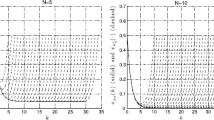Abstract
This paper describes the class of infinite horizon linear programs that have finite optimal values. A sequence of finite horizon (T period) problems is shown to approximate the infinite horizon problems in the following sense: the optimal values of theT period problems converge monotonically to the optimal value of the infinite problem and the limit of any convergent subsequence of initialT period optimal decisions is an optimal decision for the infinite horizon problem.
Similar content being viewed by others
References
G.B. Dantzig and A.S. Manne, “A complementarity algorithm for an optimal capital path with invariant proportions”,Journal of Economic Theory 9 (3) (1974) 312–323.
G.T. DeGhellinck and G. Eppen, “Linear programming solutions for separable Markovian decision problems”,Management Science 16 (1967) 371–393.
J.J.M. Evers,Linear programming over an infinite horizon (University of Tilburg Press, Tilburg, The Netherlands, 1973).
J.J.M. Evers, “Linear infinite horizon programming”, Research Memorandum EIT 45, Tilburg Institute of Economics, Tilburg, The Netherlands, (November 1973).
D. Gale, “A geometric duality theorem with economic application”,Review of Economic Studies. 34 (1) (1967).
R.C. Grinold, K.T. Marshall and R.M. Oliver, “Longitudinal manpower planning models”,Naval Research Logistics Quarterly 23 (2) (1976) 245–260.
R.C. Grinold and R.E. Stanford, “Optimal control of a graded manpower system,”Management Science 20 (8) (1974).
R.C. Grinold and D.S.P. Hopkins, “Computing optimal solutions for infinite-horizon mathematical programs with a transient stage”,Operations Research 21 (1972).
R.C. Grinold and D.S.P. Hopkins, “Duality overlap in infinite linear programs,”Journal of Mathematical Analysis and Applications 41 (1) (1973).
T. Hansen and T.C. Koopmans, “On the definition and computation of a capital stock invariant under optimization”,Journal of Economic Theory 5 (1972) 407–523.
D.S.P. Hopkins, “Infinite-horizon optimality in an equipment replacement and capacity expansion model”,Management Science 18 (1971) 145–156.
D.S.P. Hopkins, “Sufficient conditions for optimality in infinite-horizon linear economic models”, Tech. Rept. No. 69.3, Department of Operations Research, Stanford, CA (1969).
A.S. Manne, “Sufficiency conditions for optimality in an infinite-horizon development plan”,Econometrica 38 (1) (1970).
R.T. Rockafellar,Convex analysis (Princeton University Press, Princeton, NJ, 1970).
M.L. Weitzman, “Duality theory for infinite-horizon convex models”,Management Science 19 (7) (1973).
Author information
Authors and Affiliations
Rights and permissions
About this article
Cite this article
Grinold, R.C. Finite horizon approximations of infinite horizon linear programs. Mathematical Programming 12, 1–17 (1977). https://doi.org/10.1007/BF01593765
Received:
Revised:
Issue Date:
DOI: https://doi.org/10.1007/BF01593765




